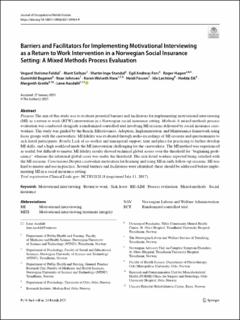| dc.contributor.author | Foldal, Vegard | |
| dc.contributor.author | Solbjør, Marit | |
| dc.contributor.author | Standal, Martin Inge | |
| dc.contributor.author | Fors, Egil Andreas | |
| dc.contributor.author | Hagen, Roger | |
| dc.contributor.author | Bagøien, Gunnhild | |
| dc.contributor.author | Johnsen, Roar | |
| dc.contributor.author | Hara, Karen Walseth | |
| dc.contributor.author | Fossen, Heidi | |
| dc.contributor.author | Løchting, Ida | |
| dc.contributor.author | Eik, Hedda | |
| dc.contributor.author | Grotle, Margreth | |
| dc.contributor.author | Aasdahl, Lene | |
| dc.coverage.spatial | Norway | en_US |
| dc.date.accessioned | 2021-09-16T06:56:52Z | |
| dc.date.available | 2021-09-16T06:56:52Z | |
| dc.date.created | 2021-03-27T15:04:00Z | |
| dc.date.issued | 2021-03-24 | |
| dc.identifier.issn | 1053-0487 | |
| dc.identifier.issn | 1573-3688 | |
| dc.identifier.uri | https://hdl.handle.net/11250/2778443 | |
| dc.description.abstract | Purpose: The aim of this study was to evaluate potential barriers and facilitators for implementing motivational interviewing (MI) as a return to work (RTW) intervention in a Norwegian social insurance setting. Methods: A mixed-methods process evaluation was conducted alongside a randomized controlled trial involving MI sessions delivered by social insurance caseworkers. The study was guided by the Reach, Efectiveness, Adoption, Implementation, and Maintenance framework using focus groups with the caseworkers. MI fdelity was evaluated through audio-recordings of MI sessions and questionnaires to sick-listed participants. Results: Lack of co-worker and managerial support, time and place for practicing to further develop MI skills, and a high workload made the MI intervention challenging for the caseworkers. The MI method was experienced as useful, but difficult to master. MI fdelity results showed technical global scores over the threshold for “beginning proficiency” whereas the relational global score was under the threshold. The sick-listed workers reported being satisfed with the MI sessions. Conclusions: Despite caseworker motivation for learning and using MI in early follow-up sessions, MI was hard to master and use in practice. Several barriers and facilitators were identifed; these should be addressed before implementing MI in a social insurance setting. | en_US |
| dc.description.sponsorship | Open access funding provided by NTNU Norwegian University of Science and Technology (incl St. Olavs Hospital - Trondheim University Hospital). Funding was granted by the Research Council of Norway (Grant number: 256633). | en_US |
| dc.language.iso | eng | en_US |
| dc.publisher | Springer | en_US |
| dc.relation.ispartofseries | Journal of occupational rehabilitation; | |
| dc.rights | Navngivelse 4.0 Internasjonal | * |
| dc.rights.uri | http://creativecommons.org/licenses/by/4.0/deed.no | * |
| dc.subject | Motivational interviewing | en_US |
| dc.subject | Work returns | en_US |
| dc.subject | Sick leaves | en_US |
| dc.subject | RE-AIM | en_US |
| dc.subject | Process evaluations | en_US |
| dc.subject | Mixed-methods | en_US |
| dc.subject | Social insurances | en_US |
| dc.title | Barriers and Facilitators for Implementing Motivational Interviewing as a Return to Work Intervention in a Norwegian Social Insurance Setting: A Mixed Methods Process Evaluation | en_US |
| dc.type | Peer reviewed | en_US |
| dc.type | Journal article | en_US |
| dc.description.version | publishedVersion | en_US |
| cristin.ispublished | true | |
| cristin.fulltext | original | |
| cristin.qualitycode | 1 | |
| dc.identifier.doi | https://doi.org/10.1007/s10926-021-09964-9 | |
| dc.identifier.cristin | 1901459 | |
| dc.source.journal | Journal of occupational rehabilitation | en_US |
| dc.relation.project | Norges forskningsråd: 256633 | en_US |

